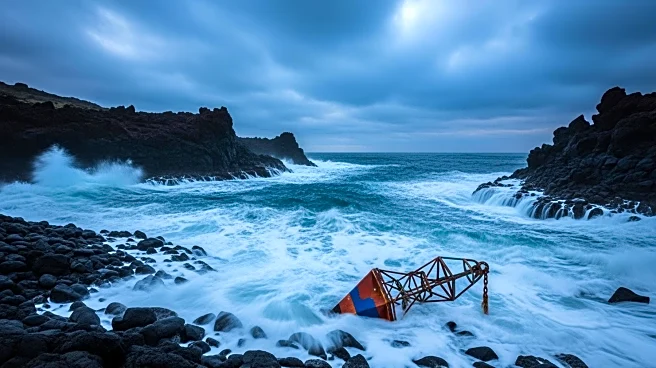What's Happening?
Iceland has declared the potential collapse of the Atlantic Meridional Overturning Circulation (AMOC) a national security threat. This decision follows mounting evidence that these crucial ocean currents, which regulate Iceland's climate, could be on course
for collapse. The AMOC acts as a conveyor belt, transporting warm water from the Southern Hemisphere to the Northern Hemisphere, where it cools and sinks. Recent research suggests the AMOC is slowing down due to global temperature increases, disrupting the balance of heat and salinity. Iceland's Minister for Environment, Energy, and Climate, Jóhann Páll Jóhannsson, emphasized the existential threat posed by the AMOC's potential collapse, which could devastate infrastructure, transport, and vital industries like fishing.
Why It's Important?
The collapse of the AMOC would have catastrophic global impacts, including rising sea levels in the U.S. and Europe, disrupted monsoon systems in Asia and Africa, and severe winter conditions in Europe. Iceland's decision to classify this as a national security threat highlights the seriousness of the issue and the need for coordinated government responses. The designation ensures that the matter receives the attention it deserves, prompting high-level efforts to understand and mitigate the threat. The potential impacts extend beyond Iceland, affecting global weather patterns, agriculture, and economies, underscoring the need for international awareness and action.
What's Next?
Iceland's National Security Council has designated the AMOC's potential collapse as a national security risk, marking the first time a climate impact has received this designation in the country. This decision will lead to a coordinated government response to understand the threat and develop strategies to prevent and mitigate its worst consequences. Other countries may follow Iceland's lead, recognizing the global implications of an AMOC collapse. Scientists continue to study the potential impacts on societies and economies, with research pointing to destroyed crops and catastrophic flooding as possible outcomes.
Beyond the Headlines
Iceland's decision represents a shift in how the country perceives climate risks, treating them as matters of national survival and security. This approach may influence other nations to reassess their climate policies and prioritize long-term environmental stability. The designation of the AMOC collapse as a national security threat could lead to increased funding for climate research and adaptation strategies, fostering international collaboration to address shared environmental challenges.
















